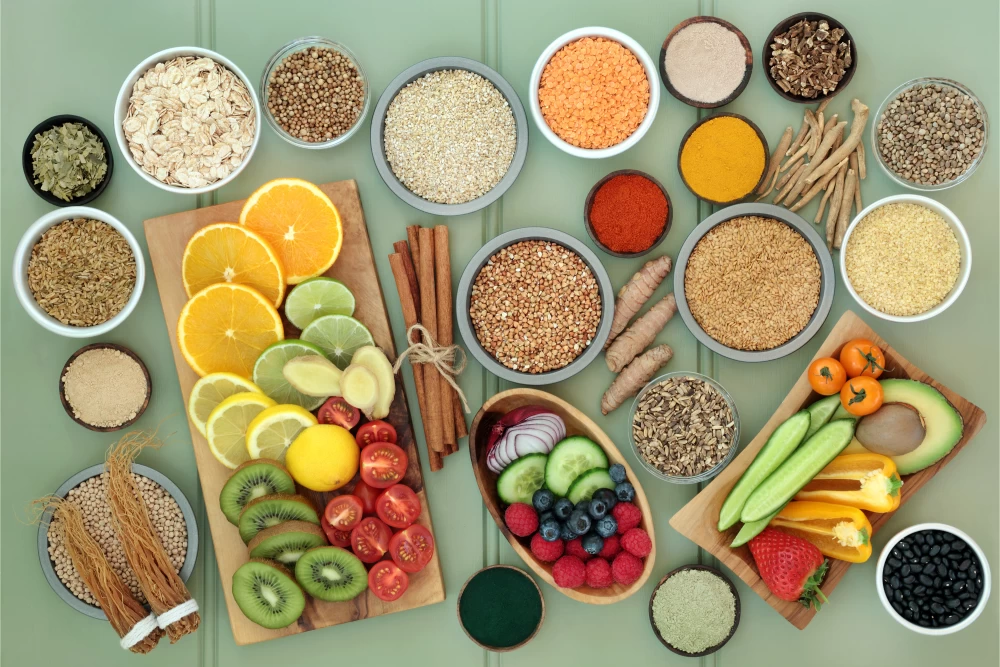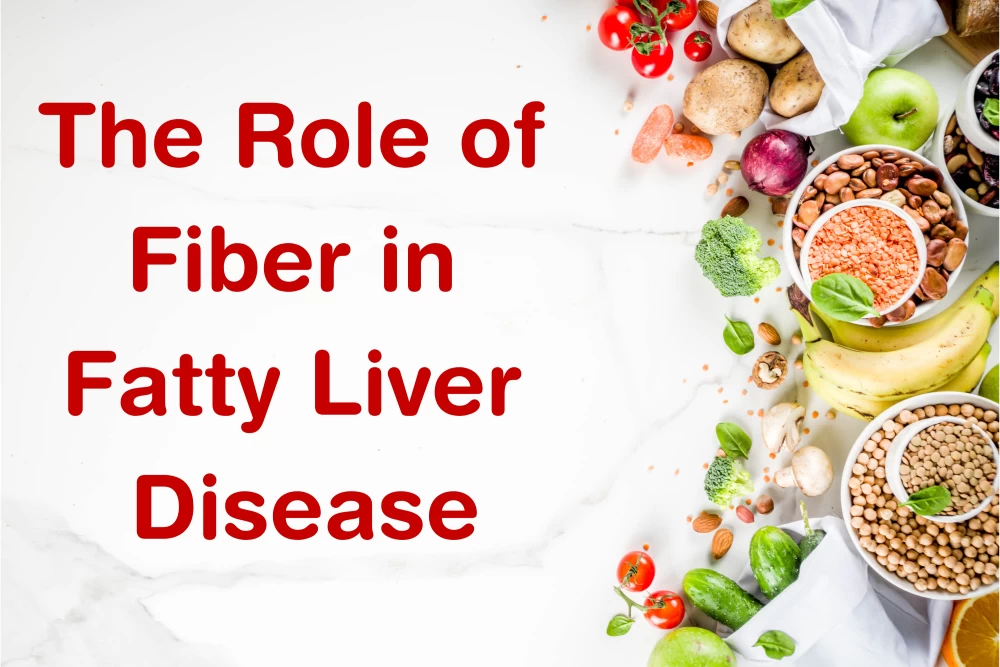
- 24th March 2023
Table of Contents
What is Fatty Liver?
Fatty liver is a common condition where the liver becomes laden with excess fat due to various reasons, such as excessive alcohol consumption, obesity, or unhealthy diets. This buildup of fat can cause inflammation and scarring in the liver, leading to serious health complications such as cirrhosis and liver failure. Therefore, it is essential to adopt healthy lifestyle changes that include a balanced diet rich in fiber. Fiber plays an important role in maintaining good digestive health and preventing fatty liver disease. Fiber-rich foods help regulate blood sugar levels by slowing down the absorption of glucose from the bloodstream into the body. This helps prevent insulin resistance which is one of the primary causes of fatty liver disease. Research has shown that consuming high-fiber diets can significantly decrease the risk of developing fatty liver disease by reducing inflammation levels in the body. Foods like fruits, vegetables, whole grains, beans and legumes are some excellent sources of fiber that should be included in a healthy diet for people with or at risk for developing fatty liver disease. Additionally, a high-fiber diet also promotes weight loss which can further reduce one's risk factors for this condition.
Benefits of a High-Fiber Diet
A high-fiber diet is critical for healthy living, and it has numerous benefits for individuals with a fatty liver. First, fiber-rich foods can assist in reducing weight and body fat, which are primary risk factors for fat accumulation in the liver. Second, fiber helps to control blood sugar levels by slowing down the absorption of glucose into the bloodstream. This reduces insulin resistance and prevents excess sugar from being stored as fat. Thirdly, a high-fiber diet aids digestion by promoting regular bowel movements and preventing constipation. Fiber also feeds beneficial gut bacteria that aid in digestion and support overall health. Fourthly, consuming fiber-rich foods may help reduce inflammation throughout the body, including the liver. Additionally, high-fiber diets have been linked to lower rates of heart disease and certain types of cancer such as colon cancer. Some excellent sources of dietary fiber include fruits such as berries and apples; vegetables like broccoli and artichokes; legumes such as lentils and chickpeas; nuts like almonds or walnuts; whole grains like oats or barley; seeds such as chia or flaxseeds among others. Therefore incorporating more high-fiber foods into your fatty liver diet is essential for maintaining good health while promoting effective weight management at the same time.
Soluble vs. Insoluble Fiber
Soluble and insoluble fibers are two types of dietary fibers that provide numerous health benefits, especially for those with a fatty liver. Soluble fiber dissolves in water and forms a gel-like substance in the digestive tract, slowing down digestion and helping to regulate blood sugar levels. It also binds with cholesterol and triglycerides, reducing their absorption into the bloodstream. Foods high in soluble fiber include oats, beans, lentils, fruits such as apples and berries, as well as vegetables like Brussels sprouts. On the other hand, insoluble fiber does not dissolve in water but instead helps to move food through the digestive system by adding bulk to stool. This type of fiber promotes regular bowel movements and prevents constipation. Insoluble fiber can be found in whole grains such as brown rice and barley, nuts, seeds, as well as vegetables like cauliflower and green beans. Both types of fibers are essential for good health and should be included in a balanced diet for optimal results. A high-fiber diet can help reduce inflammation associated with fatty liver disease while promoting weight loss by making you feel fuller for longer periods between meals.
Sources of Good Fiber
1. Fruits: Fruits like apples, bananas, strawberries, raspberries and pears are great sources of fiber. These fruits contain both soluble and insoluble fibers that help in reducing the risk of fatty liver disease.
2. Vegetables: Vegetables such as broccoli, carrots, kale, spinach and sweet potatoes are high in fiber content. They also have antioxidants that protect against inflammation and oxidative stress in the liver.
3. Whole grains: Whole grains like brown rice, oats and quinoa provide a good source of dietary fiber that can prevent the accumulation of fat in the liver.
Eating a diet rich in fiber is very important for people with fatty liver disease because it helps to reduce inflammation while controlling insulin levels. The three main sources of good fiber include fruits, vegetables and whole grains which should be incorporated into meals to improve overall health outcomes for individuals with fatty liver disease.
How Much Fiber for Fatty Liver?

Fiber is a crucial component of a healthy diet, especially for individuals with fatty liver disease. Fiber-rich foods such as fruits, vegetables, beans, and whole grains can help to reduce inflammation in the liver and improve overall liver function. According to research, consuming at least 25-30 grams of fiber per day can significantly lower the risk of developing fatty liver disease. In addition to reducing inflammation and improving liver function, fiber can also aid in weight loss which is important for those with fatty liver disease. High-fiber foods are typically low in calories and help people feel fuller longer, preventing overeating and subsequent weight gain. Maintaining a healthy weight is crucial for managing fatty liver disease as excess body fat can further damage the liver. It's important to note that increasing fiber intake should be done gradually to avoid digestive issues such as bloating or gas. Additionally, it's recommended to consume a variety of high-fiber foods rather than relying on supplements or processed foods labeled as "high-fiber". Incorporating plenty of fresh fruits and vegetables into meals along with whole grains like quinoa or brown rice can help meet daily fiber needs while promoting overall health benefits.
Tips for Increasing Fiber Intake
Fiber is a crucial component that should not be overlooked in a fatty liver diet. It helps regulate digestion and blood sugar levels, lowers cholesterol, and decreases the risk of heart disease. Here are some tips to increase your fiber intake:
1. Start with breakfast: Incorporate high-fiber morning meals such as oatmeal, whole-grain toast or cereal, and fruit.
2. Snack on fruits and vegetables: Instead of reaching for processed snacks, opt for fresh produce like apples, carrots, berries, and celery sticks.
3. Choose whole grains over refined ones: Swap white bread for whole-wheat bread or choose brown rice over white rice.
4. Experiment with legumes: Add beans to soups or salads or try making hummus as a dip for veggies.
5. Read labels carefully: Choose packaged foods with at least 3 grams of fiber per serving to ensure you're getting enough throughout the day.
By following these tips consistently and gradually increasing your fiber intake over time, you can reap the benefits it provides in improving your overall health while managing a fatty liver diet effectively.














